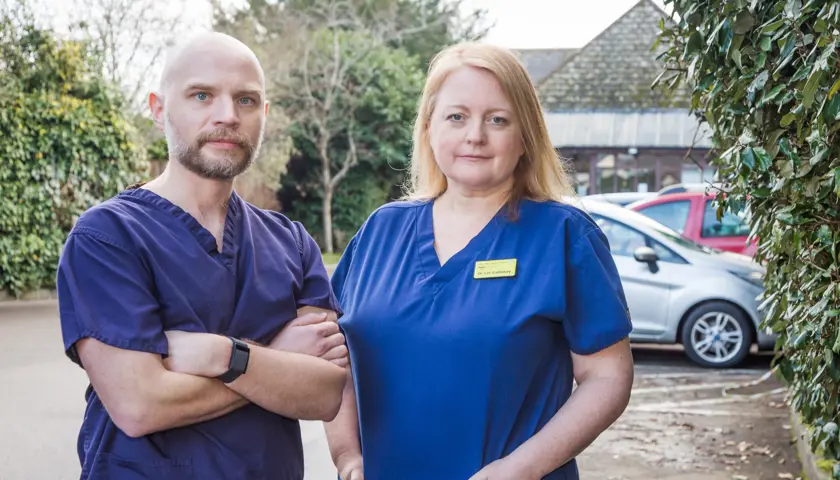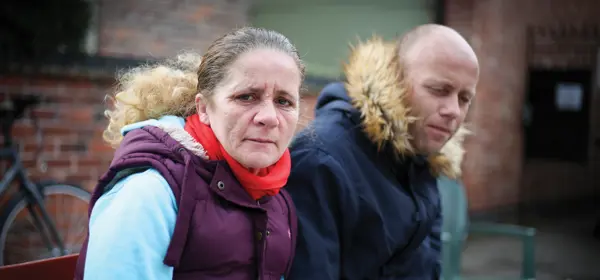
'If I get this wrong, someone might die'
GPs are working under greater pressure than ever before, but added to this is a toxic media climate and a rising tide of abuse from a minority of patients. In the first of a series of pieces from the front line, Seren Boyd visits a GP practice in Surrey and hears why change is urgently needed
Dave Triska is used to pressure: he is ex-army and came to this quiet corner of Surrey direct from a tour in Afghanistan. But there are days, many days, when he and his managing partner, Lis Galloway, feel the workload at Witley Surgery is out of control.
Take that mid-December day, during the Strep A spike… ‘For about 30 seconds, I had the same visceral response as when a daisy-chain IED went off in the compound in Afghanistan, and all these injured people were streaming towards me,’ he says, without hyperbole.
‘Then you pull your big boy pants up and get on with it.’
On the Tuesday after the New Year bank holiday, they had 459 contacts, more than double their pre-COVID average, and declared a ‘black alert’.
It feels like ‘being morphed into an urgent care centre’; the next nearest is 30 minutes’ drive away. It is a Monday morning in January and Drs Triska and Galloway are huddled over their computers, back-to-back in their triage ‘hot room’.
Surge in demand
By noon, they’ve had almost 200 contact requests, to be dealt with today by two nurses and five doctors, including them. Neither of them ever sleeps on a Sunday night: a normal Monday is 11 hours long.
They’re good at flex. The whole team, including reception staff, have had change management training and adopted digital tech enthusiastically: they switched to telemedicine in 2017. In terms of efficiency, access and case management, they’re ‘probably doing the best medicine we ever have’, says Dr Triska.
But it’s not enough. The reasons behind such a surge in demand are complex, and not unique to Witley village.
We’re rapidly losing the moral imperative in healthcare
Dr Triska
Their 11,000-strong patient population is among the oldest in the UK, typically still living independently: more than half have long-term care needs.
They’re also well-educated and well-read. Dr Galloway winces at a request for ‘a referral today’; a prescription of statins requires a detailed discussion about enzymes.
Increased health anxiety since COVID and ‘uncontrolled transmission’ of winter viruses have played a part. But the fallout of secondary care delays is devastating.
Appropriate help
Dr Triska gives a ‘not uncommon’ example: patients with severe rheumatological pain who have lost jobs waiting for a diagnosis and plummeted into depression. Previously, they would have been seen within two weeks and could have expected a resolution within seven months.
Today, they have little prospect of help for either condition. Mental health issues now account for about 40 per cent of Dr Triska’s caseload. He has had one patient seen by a psychologist locally in five years. Last Friday he spent hours trying to find appropriate help for a suicidal patient – and failed.
‘My threshold for “this is bad” is quite high but this is a car crash. If I get this wrong, someone might die.’
Vandalism
The pressures are largely hidden from patients. The waiting room is quiet today, a reflection of effective online triage, remote consulting and the decision to move the dispensary hatch to an external wall.
Despite high patient-satisfaction ratings, ‘negativity’ has increased, says receptionist Sam. A few weeks ago, they called police when a patient became physically aggressive with one of her colleagues.
Staff cars have been vandalised, anti-vax propaganda pasted on the door. The disgruntled come preloaded with media-fed arguments, says Dr Galloway. ‘They assume we’re withholding a service, putting barriers up, and we’re really not.’
You look to national leaders and there's just silence
Dr Galloway
Recruiting non-clinical team members, especially reception staff, has been hard, according to business manager Martin Norton. ‘Good patient care is why we get up in the morning and why we’re all here.’
The big ‘unseen work of general practice’ is the risk it holds, Dr Galloway says. And, worst of all, there’s no back-up, guidance or leadership.
‘We can say we’re full but if an unwell child comes to us at 4pm, we’re not going to turn them away. You look to local and national leaders and there’s just silence.’ Innovation in the way primary care is delivered is vital, says Dr Triska, but that is impossible without rebuilding trust.
‘We’re rapidly losing the moral imperative in healthcare: we’re all traumatised because we’re not delivering the care we want to, we’re being trashed and we can’t trust our leaders to look after us. We’re on our own.’



